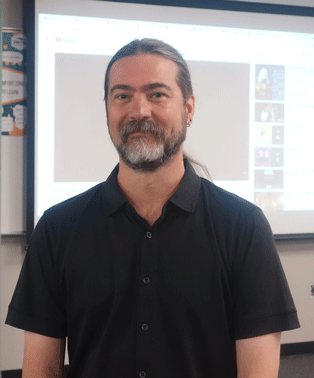Michael Maher, Spoon River College sociology teacher, was the nominee for the 2021 Illinois Community College Trustee Association Full-Time Faculty award. The award honors teaching excellence, the ability of a teacher to take a personal interest in students, and to inspire enthusiasm through their teaching techniques.
This is the second time Maher has been the ICCTA nominee. He has also been honored twice with the H. Truman Standard Award for teaching excellence, in 2006 and 2016.
Nearing his 25th year of teaching at Spoon River College, Maher’s focus is on social problems and inequality issues as they relate to race and gender, and his teaching style is often described by students and colleagues alike as passionate. He doesn’t disagree with that, and it may be because education itself is something Maher passionately values.
“Learning is often thought of as a purely cognitive exercise, but learning is also a deeply emotional experience. Faculty who successfully fuse the cognitive and the emotional components of learning are better equipped to teach in ways that are meaningful and life changing.”
Developing a rapport with students both inside and outside of the classroom is key to Maher’s teaching style and it starts with how he arranges his classroom; he arrives fifteen minutes early to prep his materials, cue up some music, and talk with students as they arrive. “The opportunity to talk with students prior to class is an important time. When an inviting environment is created, students are more likely to show up for class on time and often come early to be a part of the discussion. When students begin talking before class, they engage more quickly when class begins.”
He continues that engagement outside of the classroom by making it a point to attend student events whenever possible, such as Phi Theta Kappa inductions, theatrical performances, and athletic events.
Maher was the driving force behind implementing an annual College Theme—now in its twelfth year—as a way of promoting the value of general education coursework. “Helping students understand the value of that coursework and the purpose of a liberal arts education has always been a passion of mine,” Maher said. “The goal is for students to see the overlap in academic disciplines as well as appreciate the contributions made by various fields.”
Maher’s passion for education extends to those outside of the college. “I’ve come to understand the significance of the word ‘community’ in community college, and I believe that it’s important to provide learning opportunities for citizens in the communities served by Spoon River College.” He has served as a guest lecturer at WIU and the Unitarian Universalist Fellowship in Macomb, offered community education classes in Canton and Macomb, and over the summer offered a series of classes to all SRC employees.
Having a deep appreciation for the history of the college governance system within higher education—”It fosters collaborative decision making and promotes decisions that are focused on students, learning, and teaching.”—Maher has served on at least one standing committee almost every year of his tenure, including eight years as the college senate chair. He has served as president of the faculty union three times as well as serving several years on the union executive committee and participating in contract negotiations. For the past six years, he has served as the Division Chair for Social, Behavioral, and Health Sciences.
Comments from students supporting Maher’s nomination made it clear that he is succeeding in his goal of building connections with those in his classroom. “Mr. Maher inspires students with his passion, always lets us speak freely, makes his textbooks affordable, and emphasizes that we all are sociologists at heart,” said one, while another wrote, “He reaches out when he notices someone struggling, and he never leaves us lost and confused. I’ve taken multiple courses from Mr. Maher and he never misses class. He is always early, greeting us, and enthusiastic about what he’s teaching.”
What is the one thing Maher would most like his students to understand about a college education?
“Education is a vehicle to a better career and overall quality of life, but education means so much more than a career path or income. Education leads to thinking, informed decision making, questioning, and changing our mind. I want my students to be professionally successful, but more than that I want my students to discover what they are passionate about, what they care about, and what really matters to them.”

